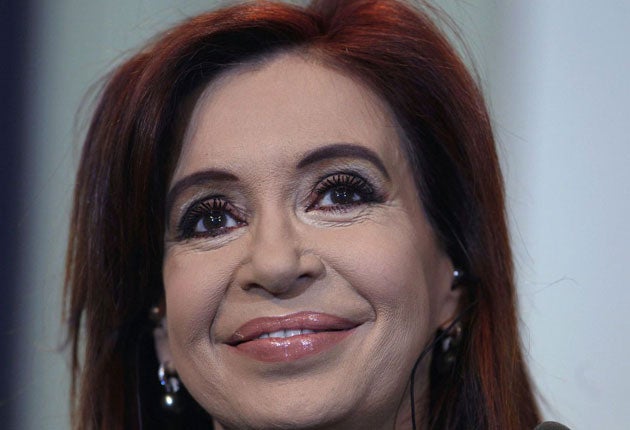Fernandez way ahead in Argentina primary

Argentine President Cristina Fernandez had a very wide lead in Sunday's primary, partial official results showed, putting her on course to win re-election in October and deepen interventionist policies.
Centre-left Fernandez had 49 per cent of votes in the primary with around 16 per cent of votes counted - a gaping 35.9 percentage points ahead of next-placed centrist opposition congressman Ricardo Alfonsin, the government said.
The primary was effectively a nationwide opinion poll because parties had already chosen their candidates and voters could cast ballots for any party's candidate. The result appeared to show Fernandez with no real competition heading into the October 23 election, and on track for a first round win.
At Fernandez's campaign headquarters, supporters waved flags of her son's youth movement, and held up images of her late husband and predecessor as president Nestor Kirchner and of Argentine-born revolutionary icon Ernesto "Che" Guevara.
Her team called the primary result "crushing".
"I'm here as a soldier of Nestor Kirchner," said hairdresser Jorge Robledo, 70, celebrating with hundreds of drum-banging supporters outside the campaign centre at a downtown Buenos Aires hotel. "He turned the page of history, and Cristina is continuing his thinking and work."
Kirchner and Fernandez are credited by supporters with steering the country back toward prosperity after a devastating financial crisis in 2001 and 2002 that triggered a world record sovereign debt default in the major grains producer.
"I call on everyone to think about the big picture, to be united. The world is in difficulty, but if we manage to get over our differences ... we can learn to make fewer mistakes," Fernandez told cheering supporters, referring to global economic turmoil and extending an olive branch to her rivals.
Kirchner died last year and Fernandez says she would dedicate a second term to continuing his policies, which emphasise import substitution and subsidies for the poor
Fernandez has a wide lead in opinion polls, although she has enraged farmers and grain exporters with interventionist policies meant to strengthen the hand of the state in Latin America's third largest economy.
Wall Street criticises Fernandez, 58, for imposing price controls, raiding central bank reserves to make debt payments and publishing inflation data that underestimate what private economists say is a real annual rate of over 25 per cent.
Argentina's fragmented opposition had been hoping to capitalise on Fernandez's widely-criticised combative style, rampant inflation and rising crime, but remain in disarray.
The government said the voter turnout for the primary was a high 76 per cent. The vote count could continue today.
Fernandez has feuded for years with growers who say her interventionist policies, such as corn and wheat export curbs, hurt profits. She draws few votes in rural areas and most of her support resides in the vote-heavy Buenos Aires suburbs.
The president's campaign has been helped by strong economic growth driven by booming grain export revenues, though many Argentines are struggling with inflation fast outpacing wage increases for a third of Argentines in the informal sector.
"As it turns out, we were right," Fernandez recently said in a comment aimed at Wall Street analysts who warned that her policies would lead to ruin. She promises to "deepen the model" of her government if she wins a second four-year term.
If Fernandez's lead in the primary holds, it will reinforce the view that she can avoid a runoff vote in October by winning re-election outright in the first round with 45 per cent of the votes or 40 per cent plus a 10-point lead over the runner-up.
If Fernandez is re-elected by only a small margin, investors hope it might force her to rethink her policies and come up with an orthodox response to problems such as high inflation. The government currently fines economists who publish inflation estimates that it does not agree with.
"Our baseline scenario is that she will be re-elected, whether it be in the first round or the second," said Boris Segura, a Nomura International Securities analyst in New York.
Reuters
Join our commenting forum
Join thought-provoking conversations, follow other Independent readers and see their replies
Comments
Bookmark popover
Removed from bookmarks